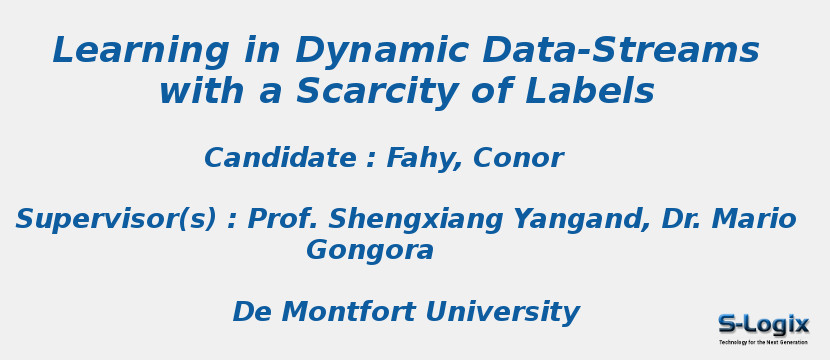Research Area: Machine Learning
Analysing data in real-time is a natural and necessary progression from traditional data mining. However, real-time analysis presents additional challenges to batch-analysis; along with strict time and memory constraints, change is a major consideration. In a dynamic stream there is an assumption that the underlying process generating the stream is non-stationary and that concepts within the stream will drift and change over time. Adopting a false assumption that a stream is stationary will result in non-adaptive models degrading and eventually becoming obsolete. The challenge of recognising and reacting to change in a stream is compounded by the scarcity of labels problem. This refers to the very realistic situation in which the true class label of an incoming point is not immediately available (or will never be available) or in situations where manually labelling incoming points is prohibitively expensive. The goal of this thesis is to evaluate unsupervised learning as the basis for online classification in dynamic data-streams with a scarcity of labels. To realise this goal, a novel stream clustering algorithm based on the collective behaviour of ants (Ant Colony Stream Clustering (ACSC)) is proposed. This algorithm is shown to be faster and more accurate than comparative, peer stream-clustering algorithms while requiring fewer sensitive parameters. The principles of ACSC are extended in a second stream-clustering algorithm named Multi-Density Stream Clustering (MDSC). This algorithm has adaptive parameters and crucially, can track clusters and monitor their dynamic behaviour over time. A novel technique called a Dynamic Feature Mask (DFM) is proposed to sit on top of these stream-clustering algorithms and can be used to observe and track change at the feature level in a data stream. This Feature Mask acts as an unsupervised feature selection method allowing high-dimensional streams to be clustered. Finally, data-stream clustering is evaluated as an approach to one-class classification and a novel framework (named COCEL: Clustering and One class Classification Ensemble Learning) for classification in dynamic streams with a scarcity of labels is described. The proposed framework can identify and react to change in a stream and hugely reduces the number of required labels (typically less than 0.05% of the entire stream).
Name of the Researcher: Fahy, Conor
Name of the Supervisor(s): Prof. Shengxiang Yangand, Dr. Mario Gongora
Year of Completion: 2019
University: De Montfort University
Thesis Link: Home Page Url
